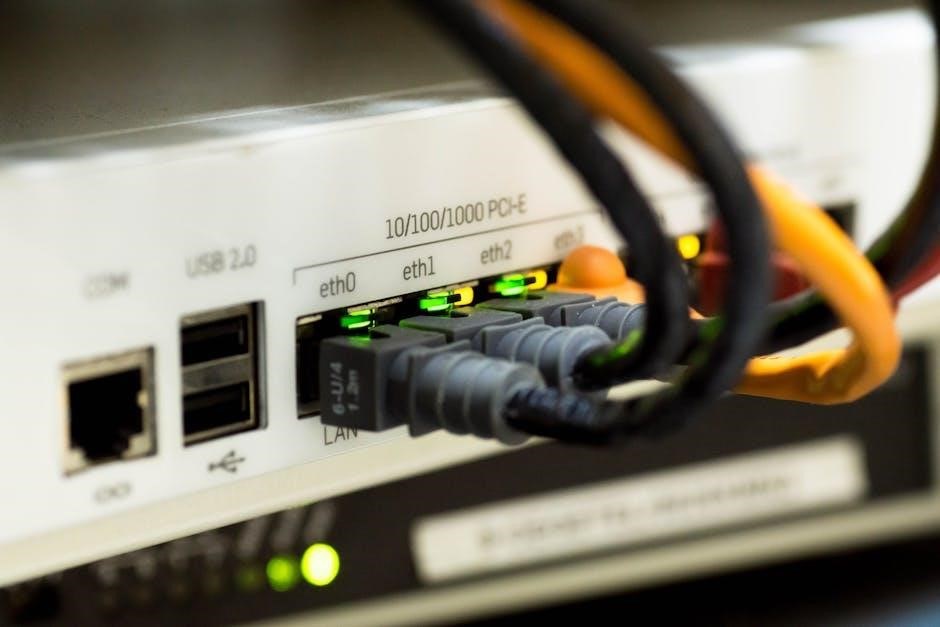The lymphatic system is a vital network of vessels, nodes, and organs that supports immune function, fluid balance, and detoxification, playing a central role in overall health.
Definition and Overview
The lymphatic system is a complex network of vessels, nodes, and organs that plays a critical role in immune defense, fluid balance, and detoxification. It operates alongside the circulatory system, facilitating the removal of interstitial fluid, proteins, and pathogens. Comprising lymphatic capillaries, vessels, nodes, and lymphoid organs, this system ensures the efficient drainage and filtration of lymph, returning it to the bloodstream. Its functions are integral to maintaining tissue health, immune surveillance, and overall physiological equilibrium, making it a cornerstone of the body’s protective mechanisms.
Historical Discoveries and Importance
The lymphatic system’s discovery traces back to the 17th century when Fabrizio Aselli first identified lymphatic vessels. Over time, scientists like William Hunter and Olof Rudbeck expanded understanding of its structure and function. Historically, its importance was underestimated until research revealed its critical roles in immunity, fluid balance, and detoxification. Modern studies highlight its significance in preventing diseases like lymphedema and immune disorders, underscoring its vital role in maintaining overall health and bodily functions, making it a cornerstone of medical research and therapeutic interventions.

Structure of the Lymphatic System
The lymphatic system consists of a network of lymphatic vessels, nodes, and organs like the spleen and thymus, working together to maintain fluid balance, support immunity, and transport nutrients.
Lymphatic Vessels and Capillaries
The lymphatic system’s vascular network includes lymphatic capillaries and vessels, which form a unidirectional pathway for lymph flow. Capillaries, thin-walled and permeable, absorb interstitial fluid, proteins, and nutrients, forming lymph. These capillaries merge into larger lymphatic vessels equipped with one-way valves and smooth muscle, enabling lymph to move toward lymph nodes. This system ensures efficient drainage and transport of lymph, maintaining fluid balance and supporting immune function, as highlighted in studies by SV Michurina and ВИ Маркова, emphasizing microcirculation and blood-lymphatic interactions.
Lymph Nodes and Their Role
Lymph nodes are critical immune hubs located throughout the body, filtering lymph to detect and neutralize pathogens. These bean-shaped structures contain lymphocytes, which recognize antigens and initiate immune responses. Nodes act as traps for bacteria, viruses, and cancer cells, preventing their spread. As lymph circulates through nodes, harmful substances are removed, ensuring the body’s defense mechanisms are robust. Their dysfunction can lead to immune deficiencies, as noted in studies by SV Michurina and VF Baytinger, highlighting their essential role in immune surveillance and overall health.
Lymphoid Organs (Spleen, Thymus, Tonsils)
The spleen, thymus, and tonsils are key lymphoid organs. The spleen filters blood, removing pathogens and old red blood cells, while the thymus is crucial for T-lymphocyte maturation. Tonsils trap pathogens entering the body through mucosal surfaces, aiding immune detection. These organs work together to ensure immune homeostasis, with the spleen’s role in blood filtration noted by K Chartakov and the thymus’s function in immune development emphasized by VF Baytinger, highlighting their collective importance in immune system integration and overall lymphatic function.
The Glymphatic System in the Brain

The glymphatic system is a specialized lymphatic network in the brain, facilitating waste removal and nutrient transport. Recent studies reveal that poor sleep disrupts this system, impairing cognitive function. Scientists at the Institute for Basic Science discovered a non-invasive method to enhance the brain’s natural waste clearance, linking sleep quality to glymphatic efficiency. This system’s dysfunction is linked to neurodegenerative diseases, emphasizing the importance of sleep in maintaining brain health and highlighting potential therapeutic targets for neurological disorders, as noted by researchers analyzing lymphatic system advancements.

Functions of the Lymphatic System

The lymphatic system filters toxins, drains interstitial fluid, transports dietary fats, and supports immune surveillance, playing a crucial role in maintaining tissue fluid balance and overall health.
Drainage of Interstitial Fluid
The lymphatic system plays a critical role in draining interstitial fluid, a clear liquid surrounding cells, back into the bloodstream. This process ensures tissue fluid balance and prevents swelling. Lymphatic capillaries, tiny vessels permeable to proteins and large molecules, absorb excess fluid from interstitial spaces. This fluid, now called lymph, flows through lymphatic vessels, which use one-way valves and muscle contractions to move it toward lymph nodes for filtration. The lymph is eventually returned to the venous system, maintaining proper fluid circulation. Malfunction in this process can lead to conditions like lymphedema, highlighting its vital importance.
Immune Surveillance and Pathogen Removal

The lymphatic system plays a crucial role in immune surveillance by filtering lymph fluid to detect and neutralize pathogens, such as bacteria, viruses, and other foreign particles. Lymph nodes, located throughout the body, act as filtration sites where immune cells like lymphocytes and macrophages recognize and destroy pathogens. The lymphatic system also aids in the activation of adaptive immune responses by transporting antigens to lymphoid organs, where immune cells can recognize and target them. This process prevents infections from spreading and maintains overall immune system efficiency, ensuring the body remains protected from disease-causing organisms.
Transport of Dietary Fats and Nutrients
The lymphatic system is essential for the absorption and transport of dietary fats and fat-soluble nutrients, such as vitamins A, D, E, and K. After digestion in the small intestine, these nutrients are absorbed into specialized lymphatic capillaries called lacteals. The lymphatic system then transports these nutrients through lymphatic vessels, eventually returning them to the bloodstream. This process ensures proper nutrient distribution and metabolism, highlighting the lymphatic system’s role in maintaining energy balance and overall nutritional health. Without this function, the body would struggle to utilize essential dietary components effectively.

Diseases and Disorders of the Lymphatic System
Diseases and disorders of the lymphatic system arise from malfunction, leading to fluid buildup, immune dysfunction, and impaired nutrient transport, emphasizing the system’s critical role in health.
Lymphatic Malfunction and Its Consequences
Lymphatic malfunction occurs when the system fails to drain interstitial fluid effectively, leading to conditions like lymphedema, characterized by swelling in limbs. This impairment disrupts immune function, hindering pathogen removal. Chronic issues can cause fluid accumulation, organ strain, and increased infection risk. Conditions such as chylothorax, where lymph leaks into the chest cavity, further highlight the system’s critical role. Untreated malfunctions can progress, causing severe complications and emphasizing the need for early intervention to restore proper lymphatic function and maintain overall health.
Diagnostic Methods for Lymphatic Disorders

Diagnosing lymphatic disorders involves imaging techniques like MRI, CT scans, and ultrasound to visualize lymphatic vessels and nodes. Lymphoscintigraphy uses radioactive tracers to map lymph flow, identifying blockages or abnormalities. Biopsies of lymph nodes can confirm infections or malignancies. Radiographic methods also assess metastatic spread in lymph nodes. These tools help detect issues such as lymphedema, infections, or cancer, enabling timely intervention. Early diagnosis is crucial for effective treatment and managing conditions affecting the lymphatic system.

Modern Research and Advances
Recent studies highlight innovations in lymphatic vessel rejuvenation and the role of sleep in glymphatic system function, offering new insights into enhancing lymphatic health and cognitive decline.
Rejuvenation of Lymphatic Vessels in Aging
Research reveals that rejuvenating lymphatic vessels in aging mice enhances memory, highlighting the system’s role in cognitive health. Studies show that lymphatic function declines with age, impairing waste removal from the brain and contributing to neurodegenerative diseases. Enhancing lymphatic vessel function could offer therapeutic strategies to mitigate age-related cognitive decline and improve overall lymphatic system efficiency, providing new avenues for anti-aging therapies and neurological disorder treatments. This breakthrough underscores the importance of maintaining lymphatic health throughout life.
Role of Sleep in Glymphatic System Function
Sleep plays a crucial role in the glymphatic system’s ability to clear waste from the brain. Research shows that deep sleep enhances the brain’s waste removal processes, with the glymphatic system functioning more efficiently during rest. Poor sleep quality in older adults disrupts this system, leading to impaired cognitive function and potentially contributing to neurodegenerative diseases. Studies highlight that adequate sleep is essential for maintaining glymphatic health, emphasizing its importance in overall brain function and longevity. This connection underscores sleep as a vital factor in lymphatic and neurological well-being.
The lymphatic system is essential for immunity, fluid balance, and detoxification. Its proper function is vital for overall health, emphasizing the need for further research and protection.
Importance of Lymphatic Health
The lymphatic system plays a crucial role in maintaining immune function, detoxification, and fluid balance. Proper lymphatic health prevents diseases like lymphedema and supports overall well-being. A healthy lymphatic system ensures efficient removal of toxins, absorption of dietary fats, and transport of immune cells. Neglecting lymphatic health can lead to chronic inflammation and impaired immune responses. Regular exercise, a balanced diet, and adequate sleep are essential for maintaining lymphatic function. Prioritizing lymphatic health promotes longevity and reduces the risk of systemic disorders, emphasizing its vital role in sustaining life and preventing disease.

Future Directions in Lymphatic System Research
Research into the lymphatic system is expanding, focusing on its role in neurodegenerative diseases, aging, and immune function. Advances in imaging techniques and gene therapy offer potential treatments for lymphatic disorders. Studies on the glymphatic system reveal its importance in brain health, with implications for Alzheimer’s and Parkinson’s. Understanding lymphatic vessel regeneration and its impact on longevity is another key area. Future research aims to develop targeted therapies for lymphatic-related conditions, improving diagnostics and treatment options, and enhancing our understanding of its interconnected roles in human physiology and disease prevention.

































































